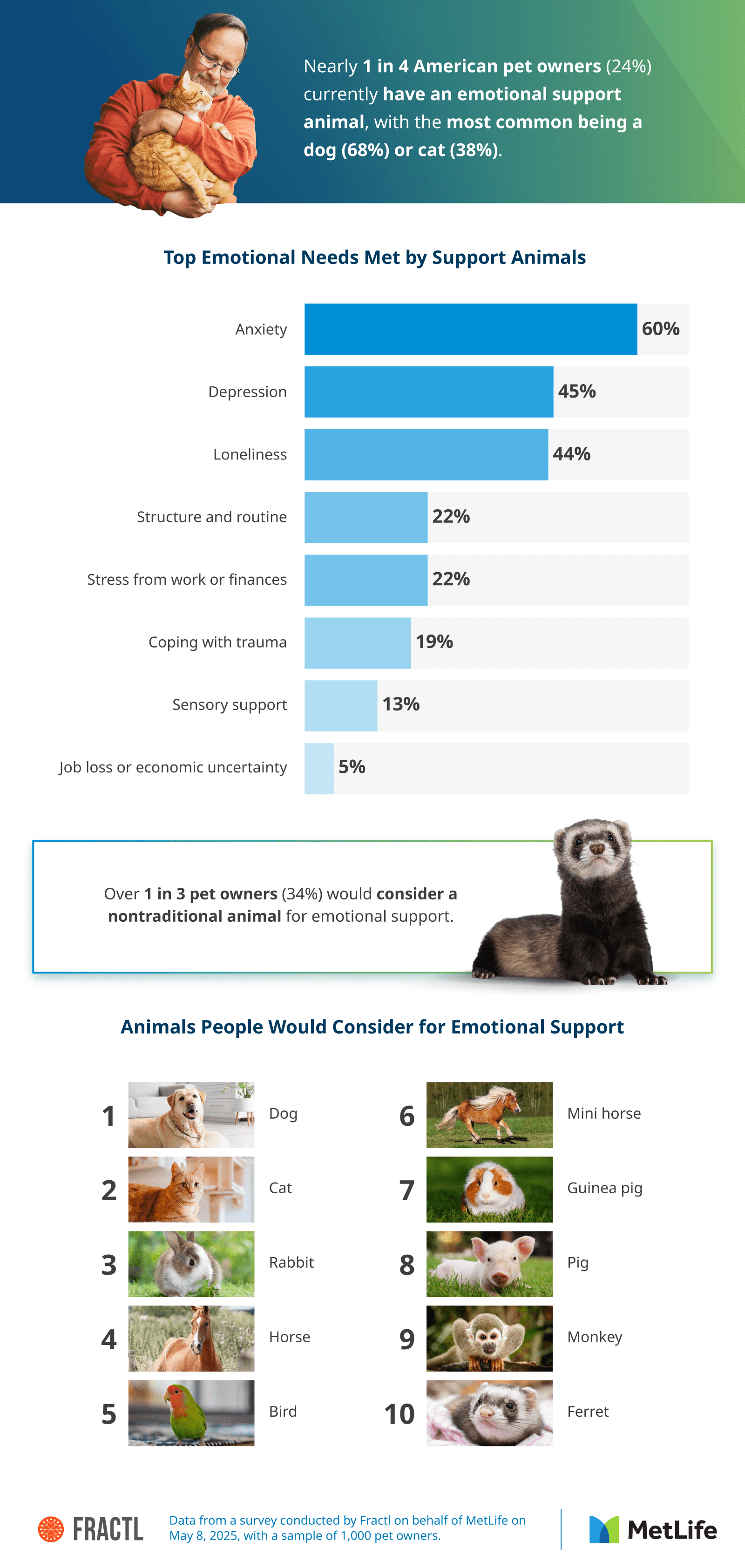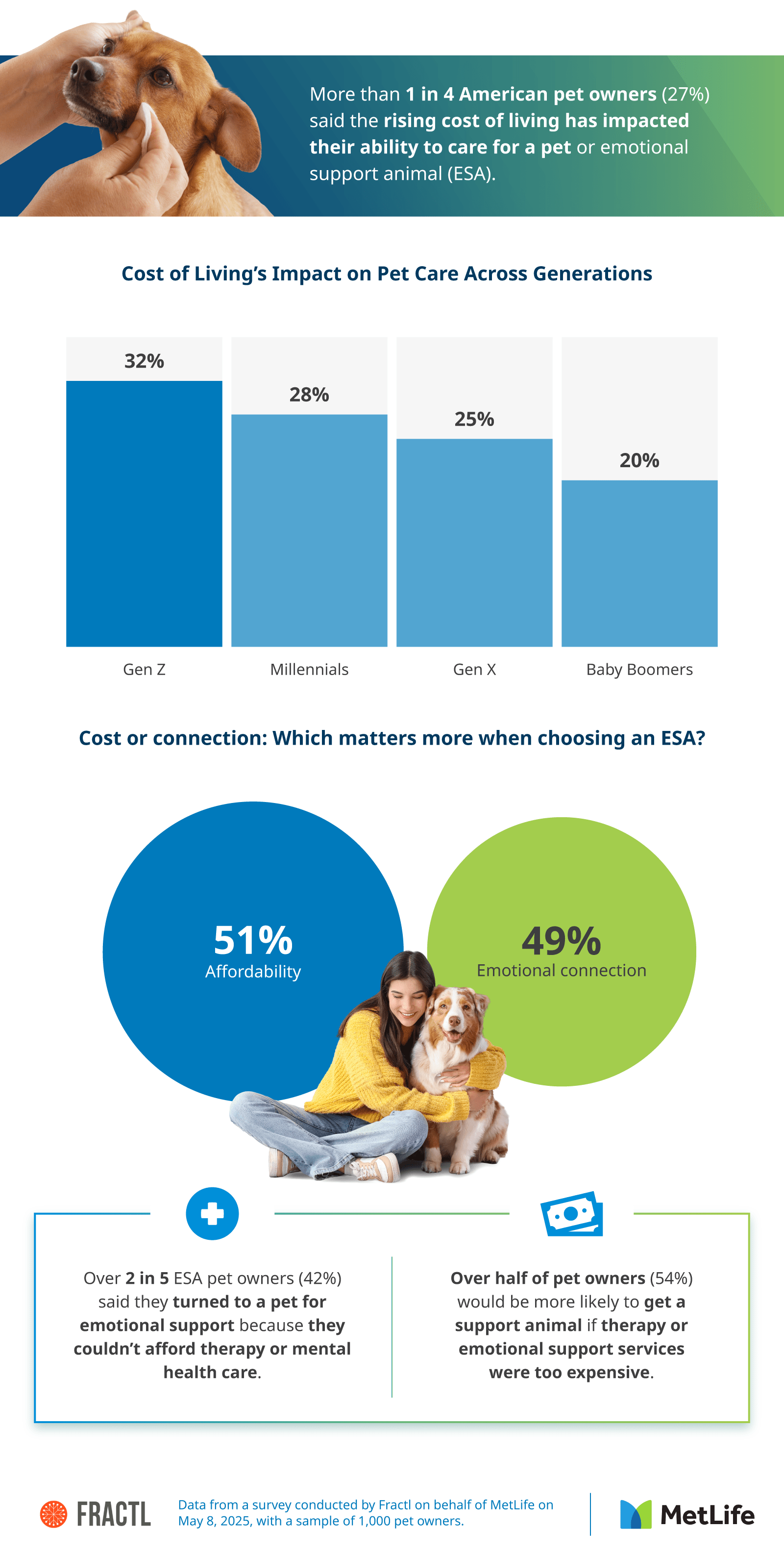PET OWNERSHIP
For many pet owners, animals offer companionship and provide emotional comfort during tough times. To better understand how pets support mental well-being, we surveyed 1,000 U.S. pet owners about their experiences with emotional support animals (ESAs), therapy alternatives, and even emerging tools like AI chatbots. The findings reveal how financial pressures, generational attitudes, and digital trends are shaping how people seek comfort and connection.
Key Takeaways
- Nearly 1 in 4 pet owners (24%) currently have an ESA, most commonly a dog (68%) or cat (38%).
- Over 1 in 3 pet owners (35%) say the rising cost of eggs has influenced their interest in owning chickens as support animals.
- More than 2 in 5 pet owners (42%) have turned to pets for emotional support because they couldn't afford therapy or mental health care.
- Over half (54%) say they would be more likely to get a support animal if therapy or emotional services were too expensive.
- Nearly 1 in 4 pet owners (24%) have used AI tools, like ChatGPT, for emotional support.
Generational Views on ESAs
Humans have long cherished the comfort of animals, but today's pet owners are split on the role of emotional support animals and what kinds of animals qualify.1
About a quarter of pet owners (24%) reported having an ESA. Gen Z leads the way in ownership at 31%, followed by millennials (25%), Gen X (20%), and baby boomers (19%). Nearly 4 in 5 pet owners (79%) considered their ESA a part of their immediate family. While dogs (68%) and cats (38%) topped the list, some people were open to more unconventional companions.
Around one-third (34%) said they would consider a nontraditional ESA, such as a rabbit, horse, bird, or pig. Chickens, in particular, are a popular option. Over 1 in 3 (35%) said the rising cost of eggs has made them more interested in raising them.2 Social platforms are also playing a role. More than 1 in 10 pet owners (13%) searched TikTok for ESA ideas, including nearly 1 in 4 Gen Z adults (23%).
Half of pet owners see ESAs as a luxury, while the other half believe they're an emotional necessity. Baby boomers were the most likely to call them a necessity (70%), followed by Gen Z (53%), Gen X (49%), and millennials (47%). Gen X stood out as the generation most likely to view ESAs as a luxury (51%).
Cost and Mental Health Access Are Driving the Shift
With therapy costs rising, many are turning to pets as more affordable sources of emotional relief.3
More than 2 in 5 Americans (42%) said they turned to a pet because they couldn't afford therapy or mental health care. That number rose to 47% among Gen Z and 45% among Gen X. Additionally, 54% said they would be more likely to get a support animal if emotional services were financially out of reach.
Economic pressures are also affecting pet care itself. Over 1 in 4 owners (27%) said that the rising cost of living has made it harder to care for their pet or ESA.4 Still, many are finding ways to prioritize their pets' emotional well-being — 61% said they've purchased something online specifically to comfort or emotionally support their pet.
As people seek out new sources of comfort, some are turning to technology. About 1 in 4 Americans (24%) reported using AI tools like ChatGPT for emotional support, with 20% of them using AI because they couldn't afford therapy.5
Surprisingly, some people (6%) said they felt more emotional comfort from a chatbot than a real pet. While not a replacement for human therapy or the companionship of a real pet, AI tools are emerging as an unexpected ally in people's search for emotional support.
Conclusion
When therapy feels out of reach, people get resourceful. Some turn to their pets, others to a chatbot. Whether it's a dog curled up at your feet or a screen that talks back when you need to vent, support looks different for everyone. What matters most is that it helps. And for pet owners, making sure their companions are cared for is part of caring for themselves.
Methodology
This survey, conducted by Fractl on behalf of MetLife on May 8, 2025, examined 1,000 American pet owners to explore the rise of emotional support animals in 2025. The average age of respondents was 40; 54% were female, 44% were male, and 1% were nonbinary. Generationally, 7% were baby boomers, 31% were Gen X, 46% were millennials, and 16% were Gen Z.
About MetLife
MetLife Pet Insurance provides comprehensive insurance solutions for pets, offering pet owners financial security and peace of mind when it comes to veterinary care. Depending on your level of coverage and the plans you choose, we can cover everything from routine check-ups to emergency services. Help your pets get the care they need and worry less about the costs.
Fair Use Statement
This content is for informational and noncommercial use only. If you'd like to share or report on these findings, please link back to this page and provide proper attribution to MetLife Pet Insurance.



